The AMD Ryzen Threadripper 3960X and 3970X Review: 24 and 32 Cores on 7nm
by Dr. Ian Cutress, Andrei Frumusanu & Gavin Bonshor on November 25, 2019 9:05 AM ESTCPU Performance: Web and Legacy Tests
While more the focus of low-end and small form factor systems, web-based benchmarks are notoriously difficult to standardize. Modern web browsers are frequently updated, with no recourse to disable those updates, and as such there is difficulty in keeping a common platform. The fast paced nature of browser development means that version numbers (and performance) can change from week to week. Despite this, web tests are often a good measure of user experience: a lot of what most office work is today revolves around web applications, particularly email and office apps, but also interfaces and development environments. Our web tests include some of the industry standard tests, as well as a few popular but older tests.
We have also included our legacy benchmarks in this section, representing a stack of older code for popular benchmarks.
All of our benchmark results can also be found in our benchmark engine, Bench.
Speedometer 2: JavaScript Frameworks
Our newest web test is Speedometer 2, which is a accrued test over a series of javascript frameworks to do three simple things: built a list, enable each item in the list, and remove the list. All the frameworks implement the same visual cues, but obviously apply them from different coding angles.
Our test goes through the list of frameworks, and produces a final score indicative of ‘rpm’, one of the benchmarks internal metrics. We report this final score.
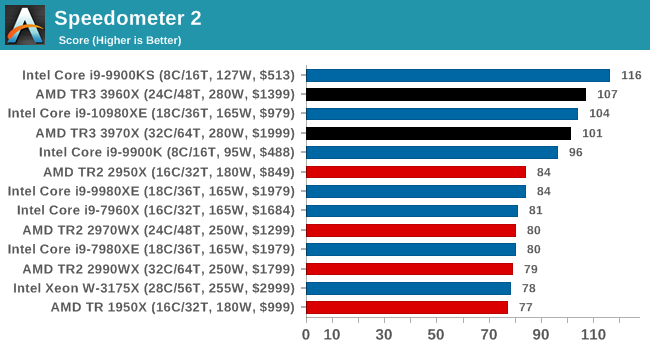
Google Octane 2.0: Core Web Compute
A popular web test for several years, but now no longer being updated, is Octane, developed by Google. Version 2.0 of the test performs the best part of two-dozen compute related tasks, such as regular expressions, cryptography, ray tracing, emulation, and Navier-Stokes physics calculations.
The test gives each sub-test a score and produces a geometric mean of the set as a final result. We run the full benchmark four times, and average the final results.
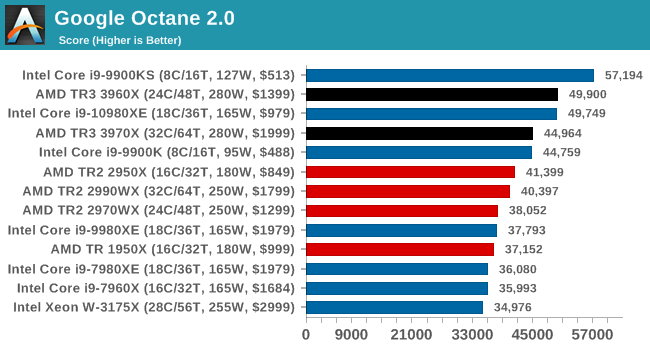
Mozilla Kraken 1.1: Core Web Compute
Even older than Octane is Kraken, this time developed by Mozilla. This is an older test that does similar computational mechanics, such as audio processing or image filtering. Kraken seems to produce a highly variable result depending on the browser version, as it is a test that is keenly optimized for.
The main benchmark runs through each of the sub-tests ten times and produces an average time to completion for each loop, given in milliseconds. We run the full benchmark four times and take an average of the time taken.
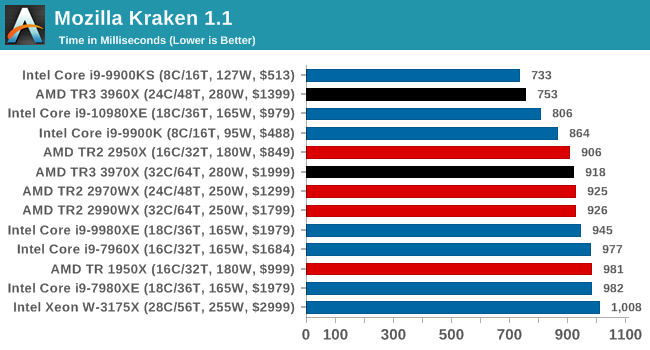
3DPM v1: Naïve Code Variant of 3DPM v2.1
The first legacy test in the suite is the first version of our 3DPM benchmark. This is the ultimate naïve version of the code, as if it was written by scientist with no knowledge of how computer hardware, compilers, or optimization works (which in fact, it was at the start). This represents a large body of scientific simulation out in the wild, where getting the answer is more important than it being fast (getting a result in 4 days is acceptable if it’s correct, rather than sending someone away for a year to learn to code and getting the result in 5 minutes).
In this version, the only real optimization was in the compiler flags (-O2, -fp:fast), compiling it in release mode, and enabling OpenMP in the main compute loops. The loops were not configured for function size, and one of the key slowdowns is false sharing in the cache. It also has long dependency chains based on the random number generation, which leads to relatively poor performance on specific compute microarchitectures.
3DPM v1 can be downloaded with our 3DPM v2 code here: 3DPMv2.1.rar (13.0 MB)
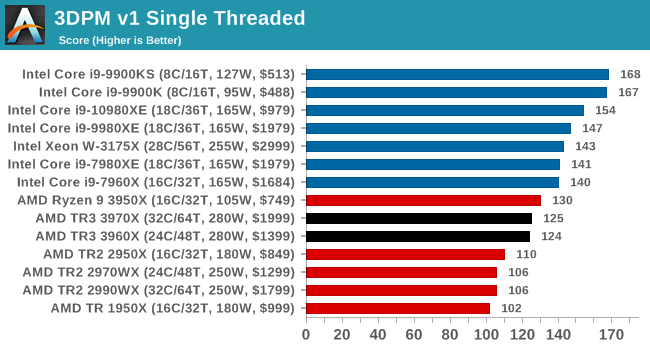
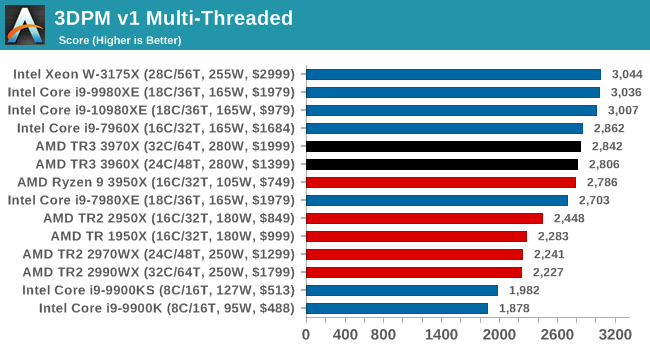
x264 HD 3.0: Older Transcode Test
This transcoding test is super old, and was used by Anand back in the day of Pentium 4 and Athlon II processors. Here a standardized 720p video is transcoded with a two-pass conversion, with the benchmark showing the frames-per-second of each pass. This benchmark is single-threaded, and between some micro-architectures we seem to actually hit an instructions-per-clock wall.
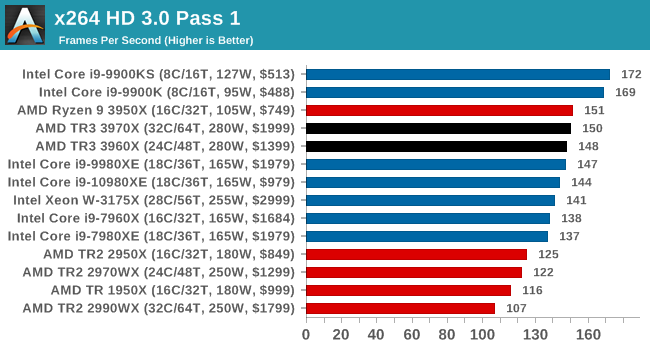
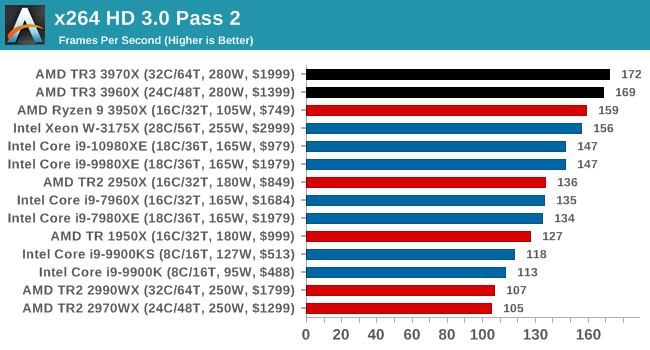
GeekBench4: Synthetics
A common tool for cross-platform testing between mobile, PC, and Mac, GeekBench 4 is an ultimate exercise in synthetic testing across a range of algorithms looking for peak throughput. Tests include encryption, compression, fast Fourier transform, memory operations, n-body physics, matrix operations, histogram manipulation, and HTML parsing.
I’m including this test due to popular demand, although the results do come across as overly synthetic, and a lot of users often put a lot of weight behind the test due to the fact that it is compiled across different platforms (although with different compilers).
We record the main subtest scores (Crypto, Integer, Floating Point, Memory) in our benchmark database, but for the review we post the overall single and multi-threaded results.
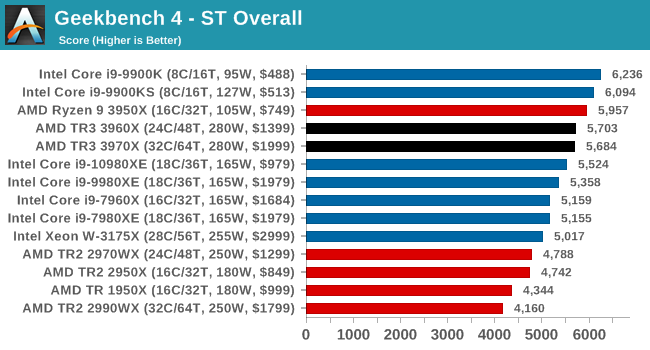
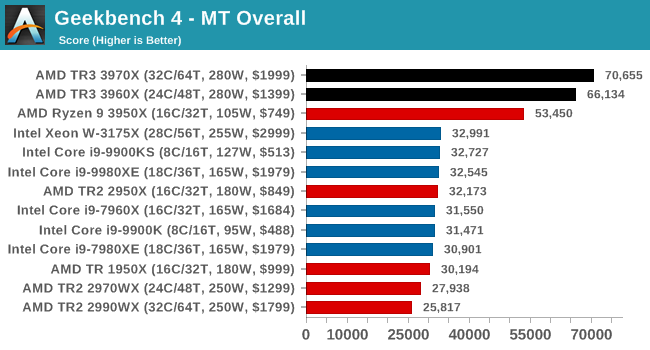










245 Comments
View All Comments
zky1 - Monday, November 25, 2019 - link
Too expensive. Anything over $300 for a cpu is a ripoff. See you in two years when these threadrippers are obsolete.peevee - Monday, November 25, 2019 - link
Very likely it is a new plateau enabled by 7nm and brand new Zen architecture developed to its potential. I predict small improvements from here for the next several years as it has been with Intel since Sandy Bridge - only better AVX512 implementation on something like 5nm and DDR5 will bring some improvements, but don't expect wonders on most tasks which don't care about memory throughput or AVX512.Slash3 - Tuesday, November 26, 2019 - link
The upcoming Zen 3 architecture revision is reported to provide up to a ~10% IPC uplift, with some neat tricks such as unifying the L3 cache per chiplet (no more CCX contention).There's always something better around the corner. :)
lobz - Tuesday, November 26, 2019 - link
Nope, it's the CCX size that changes from 4 to 8 cores.peevee - Tuesday, November 26, 2019 - link
"Up to 10%" - exactly what I have meant, a plateau, like Intel had after Sandy Bridge, adding only ~5% each year...Korguz - Tuesday, November 26, 2019 - link
peevee um intel could of improved their ipc more each year.. but they didnt, there was no reason too.. just like they could of given mainstream more then 4 cores.. but they didnt as well.. mostly because of zen.. is there more then 4 cores from intel..catheryn75 - Monday, November 25, 2019 - link
It's too bad they aren't available anywhere other then a few system builders. ie CyberPower , Origin , and others.Some of us who would use one of these new processors dont want to pay the extra 1500-2k for someone else to build it when we could do it ourselves.
AMD was really short sighted not at least having some supply at Newegg, Microcenter, Fry's, etc.. on launch day.
Dug - Monday, November 25, 2019 - link
That's a lot of power needed for 24 cores. 3960 at 280w. And it's recommended to get water cooling? They aren't going to get many buyers on that.6 more cores than Intel 10980, but needs 90w more power to get there.
I thought 7nm would be better than this.
The Xeon is way out of wack at 381.
People that really need the speed to save in man hour costs, expect a high end system with warranty, instant replacement, compatibility (especially vm), and reliability. I don't think you are going to get that with water cooling. And I don't see any major players that offer what I listed, going to a water cooled system anytime soon.
alufan - Tuesday, November 26, 2019 - link
https://www.scan.co.uk/3xs/configurator/amd-thread...pricey though but its liquid cooled
Dug - Tuesday, November 26, 2019 - link
Not exactly mainstream. I'm talking Dell, HP